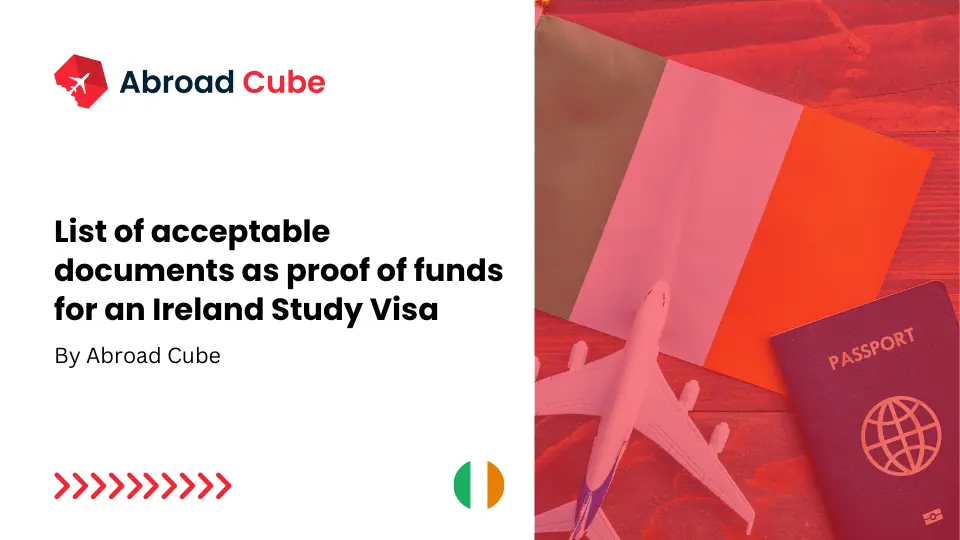-
hello@abroadcube.com
Mail us
-
Call For Help:
98779 83783
-
Whatsapp Us
70090 34921

To get an Ireland Student Visa for Bachelors and Masters, you must prove you have enough funds to cover the expected costs, such as University Fees and living and Travelling Expenses. The funds must be in liquid format and available immediately during the course. This step ensures that students can complete the intended course without financial restrictions and survive independently of part-time jobs in Ireland. Let's Explore how much Proof Of Funds you need and What documents are acceptable.
While the total cost of the Education Loan and required funds for an Ireland Study Visa, we must consider three major components: University Fees, Living Expenses and Travelling & Buffer Expenses.
| University Fees | €6000 - €30,000 |
| Living Expenses | €12,000 |
| Travelling & Buffer Expenses | €2000 |
You must prove that you have one year of Tuition Fees available to pay the University. If you have already paid the deposit or first semester fees, you must provide evidence of the leftover amount and the paid payment receipts. Most universities demand at least 50% of tuition fees, subject to a minimum of €6000. If your course duration is over one year, you must show proof of the payment plan.
If the course duration is 1 year or less, you must prove that you have funds equal to the total tuition fees. If you have already paid the deposit or first semester fees, you must provide evidence of the leftover amount and the paid payment receipts. For a bachelor's Degree with more than 1 year of course duration, you must show proof of the payment plan.
The set requirement for living expenses for international students is €1000 monthly OR €12,000 annually. You must prove that you can afford to pay the Living Expenses independently of part-time jobs.
In addition to University Fees and Living Expenses, you must keep a buffer for mandatory costs such as Flight Tickets, Visa Fees, Health Insurance, GNIB Registration Fees, etc. These expenses are expected to contribute between €1500 and €2000.
The Irish Student Visa funds must be in Liquid format and readily available. Hence, they consider only certain documents as proof of funds for study visas. Documents such as Property Registration Papers, Gold Ornaments, Precious items and Other investments are unacceptable.
The simplest way to prove that you have enough funds to study in Ireland is to show your bank balance, which is more than the required amount. To curb the rising fraudulent activities, the Immigration Office requires the Bank Balance to be there for at least 6 months unless you have a strong reason for recent large deposits. For a Visa Application, you must submit a Bank Statement for the Last 6 months and a Balance Certificate, which should be printed on the Bank's Letterhead and signed by the appropriate authority, such as the Branch Manager.
Alternatively to Bank Statements and Balance Certificates, you can also submit a Fixed Deposit Receipt, where the FD Booking date must be at least 6 months old. For a Visa Application, you must submit a copy of the Fixed Deposit Receipt and the Confirmation of the Fixed Deposit with complete details, such as Account Holder, Account Numbers, Principle Amount, Maturity Amount, and Balance on the current date. The documents must be printed on the Bank's Letterhead and Signed by the Branch Manager. Please note that the Fixed Deposit must be redeemable or encashable at any time. The Deposits with the Locking period are NOT accepted.
Ireland Universities and Immigration Bureau accept Education Loans provided by RBI-authorized Banks and NBFCs. These loans can be Secured or Unsecured. For a Visa Application, you are recommended to submit a Loan Sanction Letter and Disbursement Letter on Lender Letterhead, along with Property Valuation Report if it is a Secured Loan.
If you have taken an Education Loan to support your studies in Ireland, you are recommended to use personal funds along with the Loan. It is highly recommended that the tuition fee not be sponsored only through the education loan, which means the sponsor should have 6 months old liquid funds in their account apart from the education loan. Based on past applications, it is observed that the Immigration Bureau rejects applications which are 100% Sponsored through Education Loans.
Also, the sponsor's monthly income should be sufficiently high to cover the sponsor's expenses and the EMI of the education loan.
If your parents or sponsor have a Provident Fund (PF) account with a substantial balance, it can serve as proof of funds for studying in Ireland. When applying for a visa, you must provide a letter that includes the following information:
The letter must be printed on the employer's letterhead or from an appropriate authority and should include a signature and stamp.
Like other documents, the Irish Embassy accepts LIC Policy Surrender Certificates as Proof of Funds. To obtain this Certificate, you must complete an Application Form, attach a copy of the LIC Policy & Identification Document, and submit it to your nearest LIC branch office or courier it to the LIC Head Office. You must submit a scanned copy of your LIC Surrender Certificate for a Visa Application
Having parents or a close relative as a Sponsor is recommended for an Ireland Visa. They should have high annual income, and concerned authorities accept the below-listed documentary evidence:
For the Visa Application, you must attach an Affidavit of Support, a Sponsor's ID proving your relationship, and required Income Documents.
